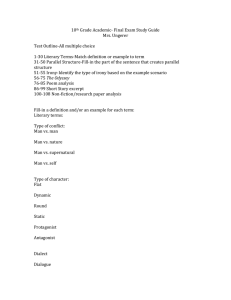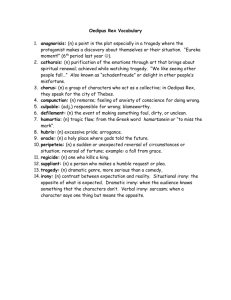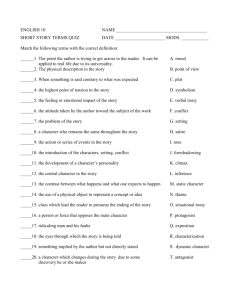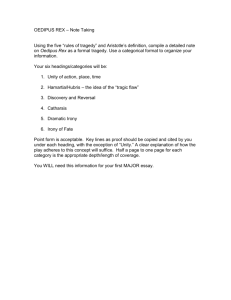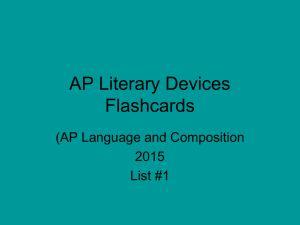Aim: What is irony, how is it used, and what is its purpose?
advertisement
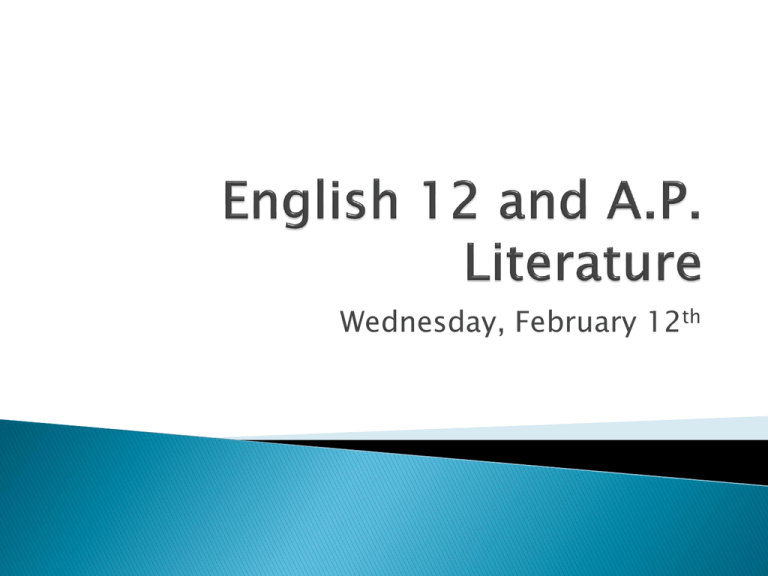
Wednesday, February 12th Do now: ◦ Please take out HW. Discuss “Digging” in pairs Partner 1: Discuss symbols and what they mean. ◦ Partner 2: Discuss how the poem functions as allegory. Agenda: -Do now and share out -Mini-lesson and exercises on irony HOMEWORK: ◦ English 12: Read poems 7 and 8 and answer the questions. ◦ AP Literature: Read poems 16-18; answer questions. AP Practice Essay (timed: 40 minutes) due on Friday. ◦ Everyone, tomorrow: Wordly Wise Ch.7 quiz, with q’s on poetic terms. ◦ Baby pics! Lit magazine! ◦ Share out “Do Now.” Discuss “Digging” in pairs (Poem 6 for Eng 12, Poem 14 for AP) Partner 1: Discuss symbols and what they mean. Partner 2: Discuss how the poem functions as allegory. (A.P. Hand out AP practice essay, due Friday.) These 3 scenarios are examples of IRONY: ◦ Jake looks outside and, seeing that it’s the middle of a hurricane, says, “What a beautiful day for a picnic!” ◦ Bill Gates, CEO of Microsoft, uses an Apple computer. ◦ You’re on the edge of your seat watching a scary movie because the girl on screen is making popcorn, unaware that there’s a man with a knife in the next room. Now, do your best to jot down a definition of IRONY on your worksheet. Irony: The expression of the opposite of the literal meaning, or a disconnect between the actual result of a sequence of events and the expected/normal result. —Merriam-Webster Dictionary In other words… a literary technique characterized by a contrast between reality (what is) and appearance (what seems to be). 3 types of irony… Verbal irony- saying the opposite of what one mean. It’s different from sarcasm, which is intended to wound the feelings, and satire, which is a more formal term for sarcasm, applied to literature; verbal irony does not intend to be cruel or kind. Dramatic irony: When you know/ understand something about the events of a story that the character in the story doesn’t know. Situational irony, •When what actually happens is the opposite of what is expected. Instructions: On your worksheet (other side), jot down the type of irony that these examples convey: ◦ Upon entering the boys’ locker room filled with the soccer team after practice, the coach remarked, “It smells like roses in here!” ◦ In the play Oedipus Rex, when Oedipus kills Laius, the audience realizes he is killing his biological father, but Oedipus doesn’t. ◦ The show The Biggest Loser was sponsored by Pepsi Cola. ◦ The fact that many of the lyrics in Alanis Morissette’s song, “Isn’t it ironic?” aren’t actually ironic. Let’s review them. Overstatement, or hyperbole, is simply exaggeration, but in the service of telling a certain truth with added emphasis. If you were to leave me, if I were to fold only my own clothes, the convexes and concaves of my blouses, panties, stockings, bras turned upon themselves, a mountain of unsorted wash could not fill the empty side of the bed. (Excerpt from “Sorting Laundry” by Elisavietta Richie) Jot down your own example. Understatement, may emphasize the truth by understating it; may be more apparent in how one says it. It may be used to be humorous, grave, fanciful, or convincing. Example: Trying to protect his students’ innocence he told them the Ice Age was really just the Chilly Age, a period of million years when everyone had to wear sweaters. And the Stone Age became the Gravel Age, named after the long driveways of the time. The Spanish Inquisition was nothing more Than an outbreak of questions such as “How far is it from here to Madrid?” “What do you call a Matador’s hat?” (Excerpt from “History Teacher” by Billy Collins) Jot down your own example. A paradox is a statement that apparently contradicts itself and yet might be true. Example: Nobody goes to that restaurant Jot down your own example. because it is too crowded. Exit slip: Raise your hand to indicate whether the following scenario is an example or irony, overstatement, understatement, or paradox: ◦ A boy, missing his girlfriend who is vacationing with her family in France, says, “My love is just across the pond.” English 12: Read poems 7 and 8 and answer the questions. AP Lit: Read poems 16-18; answer questions. Tomorrow: Wordly Wise Ch.7 quiz, with questions on poetic terms so far. Baby pics! Enter Epoch Lit mag! AP Practice Essay (timed: 40 minutes) due on Friday.
